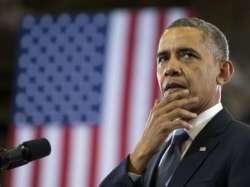Barack Obama to announce defense secretary chief on Friday
Washington: President Barack Obama's choice for his next defense chief, to be announced Friday, faces conflict abroad, budget retrenchment at home and the expectation that the White House will have a heavy hand in Pentagon

Washington: President Barack Obama's choice for his next defense chief, to be announced Friday, faces conflict abroad, budget retrenchment at home and the expectation that the White House will have a heavy hand in Pentagon affairs—at least if past is prologue.
For the job, Obama is turning to a seasoned Pentagon operative who rose up the short list when others took themselves out of contention.
The White House said Obama will announce his pick on Friday. Ashton Carter will be nominated to replace Defense Secretary Chuck Hagel, according to people close to the process who spoke on condition of anonymity before the announcement. Carter's nomination has been expected for days but Obama held off on making a statement while the vetting of the former Pentagon official was being completed.
Although defense is typically a coveted Cabinet portfolio, it has appeared less so heading into Obama's final two years in office, especially once tensions surfaced between the White House and Pentagon, where top officials complained about West Wing micromanagement.
The next defense chief will inherit a Pentagon wrestling with the Islamic State militant threat in Iraq and Syria, an unsettled course for Afghanistan, Russia's provocations in Ukraine, tensions elsewhere and reports of sexual assault in the military, all in a time of deep budget cuts.
Hagel, who is staying on until a successor is in place, resigned under pressure from the president but cast his departure Thursday as a mutual decision and said “no major differences” with Obama led to his stepping down. Asked directly whether he felt pressure to resign, Hagel was not specific.
Carter, 60, has extensive national security experience as well as keen knowledge of the inner workings of the U.S. nuclear arsenal. He served as the Pentagon's second-ranking official from 2011 to 2013, during Defense Secretary Leon Panetta's tenure, spent two years previously as the department's technology and weapons-buying chief, and was assistant secretary of defense for international security policy during Bill Clinton's administration.
He holds bachelor's degrees in physics and medieval history from Yale University and received his doctorate in theoretical physics from Oxford University, where he was a Rhodes scholar. He has served on the advisory boards of MIT's Lincoln Laboratories and the Draper Laboratory.
Carter is known among national security experts for the “preventive defense” concept he and former Defense Secretary William Perry promoted in the 1990s. The concept held that the U.S. could head off major new threats through security partnerships with Russia, China and others in the post-Cold War world.